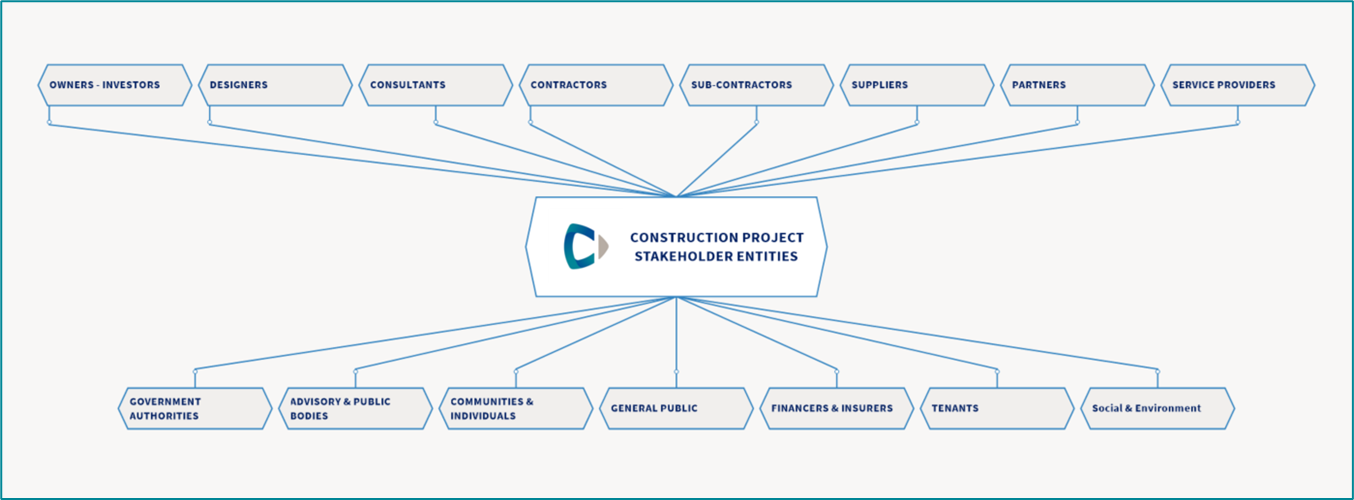In the dynamic and rapidly evolving landscape of Saudi Arabia's construction sector, effective stakeholder management emerges as a critical determinant of project success. As the Kingdom embarks on ambitious initiatives outlined in Vision 2030, including mega-projects like NEOM, the Red Sea Global, Qiddiya, and SEVEN, the need for strategic and comprehensive stakeholder engagement has never been more pronounced. Deloitte's research emphasizes the importance of stakeholder relationships in project outcomes, stressing the valuable lessons learned from the GCC construction sector. This article explores the multifaceted realm of stakeholder engagement, offering insights, strategies, and considerations tailored to the unique context of Saudi Arabia's construction industry.
Understanding the Saudi Arabian Stakeholder Landscape: A Nuanced Approach
Navigating stakeholder dynamics in Saudi Arabia requires a nuanced understanding of the socio-cultural, economic, and regulatory factors shaping the construction landscape. McKinsey & Company's research findings shed light on the intricacies of stakeholder engagement in Saudi Arabia, emphasizing the need for a comprehensive approach to relationship management. Key stakeholders include government entities, such as the Ministry of Housing and the Saudi Arabian General Investment Authority (SAGIA), private sector developers, local communities, regulatory bodies, and international investors, bringing diverse interests and expectations to the table. Tailoring engagement strategies to address these unique dynamics is paramount for project success.

Construction Project Stakeholder Entities
Advanced Strategies for Stakeholder Mapping and Analysis in Saudi Arabia
In the Saudi context, traditional stakeholder mapping approaches may need to catch up in capturing the complexity of relationships and interests. Organizations can benefit from leveraging advanced analytical tools and methodologies to gain deeper insights into stakeholder dynamics. Organizations can identify key stakeholders, map interconnections, and anticipate behavior using social network analysis and predictive modeling techniques. This strategic approach enables proactive relationship management, risk mitigation, and the identification of collaboration opportunities.
Digital Transformation and Stakeholder Engagement in the Saudi Context
The Kingdom of Saudi Arabia has made significant strides in digital transformation, with initiatives like the National Transformation Program (NTP) and the Saudi Vision 2030 Digital Transformation Program driving the adoption of digital technologies across sectors. In the construction industry, digital platforms offer unprecedented opportunities for stakeholder engagement, enabling real-time communication, collaboration, and data exchange. Cloud-based project management systems, virtual reality simulations, and augmented reality interfaces empower stakeholders to visualize project progress, provide feedback, and participate in decision-making processes. By embracing digitalization, organizations can enhance transparency, accountability, and stakeholder satisfaction throughout the project lifecycle.
Integrating Sustainability into Stakeholder Engagement Strategies
Sustainability lies at the heart of Saudi Arabia's development agenda, as outlined in Vision 2030's environmental sustainability goals and the Saudi Green Initiative. For construction projects in the Kingdom, sustainability considerations must be woven into stakeholder engagement strategies, addressing environmental, social, and governance (ESG) factors. Engaging with sustainability-focused stakeholders, including environmental advocacy groups, local communities, and regulatory authorities, can help organizations align their projects with environmental standards, promote social responsibility, and enhance long-term value creation. By integrating sustainable practices, such as green building certifications, renewable energy solutions, and waste management initiatives, organizations can validate their commitment to sustainable development and foster positive relationships with stakeholders.
Managing Complexity in Mega-Projects and Supply Chains
Saudi Arabia's mega-projects and complex supply chains present unique challenges for stakeholder engagement, including coordination across diverse stakeholders, cultural sensitivities, and geopolitical risks, particularly in projects like NEOM. Organizations must establish robust governance structures, communication protocols, and conflict resolution mechanisms to navigate these challenges effectively. Collaborating with strategic partners, local contractors, international suppliers, and government entities can foster trust, facilitate knowledge exchange, and drive innovation. Organizations can overcome project complexities, accelerate delivery timelines, and achieve shared objectives by leveraging stakeholders' collective expertise and resources.
Driving Innovation and Growth Through Collaborative Stakeholder Engagement
The Red Sea Global project is a compelling case study highlighting the transformative power of collaborative stakeholder engagement in Saudi Arabia. The project has driven innovation, fostered entrepreneurship, and created sustainable economic opportunities by involving diverse stakeholders as co-creators and partners in development. Open innovation platforms, co-design workshops, and joint ventures offer effective mechanisms for stakeholders to co-create solutions and address shared challenges. Engaging with local communities as partners ensures inclusive growth and social empowerment.
Future Trends and Opportunities in Stakeholder Engagement for Saudi Arabia
Emerging trends and opportunities shape the future of stakeholder engagement in Saudi Arabia's construction sector. Technologies such as blockchain, artificial intelligence, and big data analytics hold the potential to revolutionize stakeholder engagement in Saudi Arabia. Specific examples of their application, such as blockchain-enabled transparency in supply chains and AI-driven predictive analytics for stakeholder behavior, showcase their transformative impact. Moreover, evolving regulatory frameworks, such as the new Saudi Companies Law and the Public Investment Fund's (PIF) governance reforms, present opportunities to enhance engagement practices and drive sustainable development. By staying informed of these trends and leveraging them to their advantage, organizations can position themselves as leaders in stakeholder engagement and drive sustainable development in Saudi Arabia.
Conclusion: Charting a Course for Sustainable Development
In conclusion, effective stakeholder engagement is fundamental to achieving the sustainable development goals outlined in Vision 2030. By adopting advanced strategies, leveraging digital technologies, and embracing sustainability, organizations can navigate the complexities of stakeholder management and drive positive outcomes for all stakeholders involved. Let us recognize the pivotal role of stakeholder engagement in shaping the future of construction in Saudi Arabia and work collaboratively to realize the vision of a prosperous, sustainable, and inclusive built environment.
If you're ready to embrace Stakeholder Management practice in your construction business, contact Bashar to discuss tailored strategies and solutions for your needs. Together, we can pave the way for sustainable growth and success in the Saudi Arabian construction sector.
